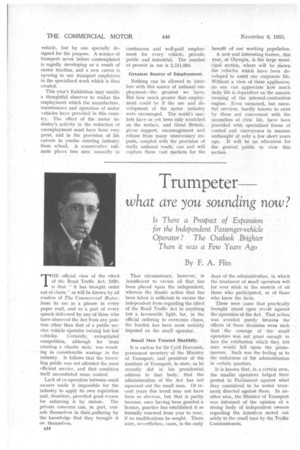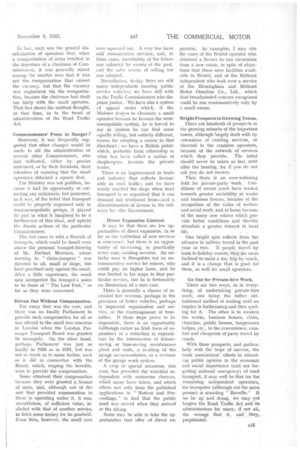Trumpeter
Page 136

Page 137

If you've noticed an error in this article please click here to report it so we can fix it.
what are you sounding now?
Is There a Prospect of Expansion for the Independent Passenger-vehicle Operator? The Outlook Brighter Than it was a Few Years Ago By F. A. Flin THE official view of the effect of the Road Traffic Act, 1930, is that "it has brought order out of chaOs," as will be known by all readers of The Commercial Motor, from its use as a phrase. 'in every piper read, and as a part of every speech 'delivered by any of those who haVenbserved the Act from any position 'other than that of a public service Vehicle Operator 'owning but ieii vehicles. Certainly, unregUlated competition, although far from creating a chaotic state, was result
, ing in considerable wastage in the industry. It follows that the travelling public was not afforded the most efficient service, and that condition itself necessitated some control.
Lack of co-operation between small owners made it impossible for the industry to apply its own regulation and, therefore, provided good reason for enforcing it by statute. The private concerns can, in part, console themselves in their „suffering by the knowledge that they brought it on themselves.
814 That circumstance, however, is insufficient to excuse all that has been placed upon the independent, whereas the drastic action that has been taken is sufficient to excuse the independent from regarding the effect of the Road Traffic Act in anything but a favourable light, flat', in the official ordering to overcome chaos, the burden has been most unfairly imposed on the small operator.
Small Men Treated Shabbily.
It is useless for Sir Cyril Hurcomb, permanent secretary of the Ministry of Transport, and president of the Institute of Transport, to state, as he recently did in his presidential address to that body, that the administration of the Act has not squeezed out the small man. Of recent years this trend may not have been so obvious, but that is partly because, once having been granted a licence, practice has established it as formally renewed from year to year, if no modifications be sought. There were, nevertheless, cases, in the early
days of the administration, in which the treatment of small operators will for ever stink in the nostrils of all those who participated, or of those who knew the facts. • " These were cases that practically brought about open revolt against the operation of the Act. That action' was avoided purely because the effects of these decisions were such that the courage of • the small operators was not great enough to face the retribution which they felt sure would fall upon the primemovers. Such was the feeling as to the unfairness of tht administration in certain quarters.
It is known that, in a certain area, the smaller operators lodged their protest in Parliament against what they considered to be unfair treatment directed against them. In another area, the Minister' of Transport was informed of the opinion of a strong body of independent owners regarding the injustices meted out solely to the small man by the Traffic Commissioners.
In fact, such was the general dissatisfaction of operators that, when a reorganization of areas resulted in the departure of a chairman of Commissioners, it was generally stated among the smaller men that it was not the reorganization that caused the vacancy, but that the vacancy was engineered via the reorganiza: tion, because the chairman had dealt too fairly with the small operator. That fact shows the existent thought, at that time, as to the trend of administration of the Road Traffic Act.
Commissioners' Posts in Danger ?"
Moreover, it was frequently suggested that other changes would be made to rid the administration of several other Commissioners, who had indicated, either by precise statement, or by their decisions, their intention of ensuring that the small operators obtained a square deal.
The Ministry was not guiltless, because it had its opportunity of correcting any unfairness, but possessed, as it was, of the belief that transport could be properly organized only in semi-monopolistic groups, it played its part in what it imagined to be a furtherance of this ideal, and upheld the drastic actions of the particular Commissioners.
The Act came in with a flourish of trumpets, which could be heard even above the, personal trumpet-blowing of Mr. Herbert Morrison, whose warning to " claim-jumpers " was directed to all, small or large, but later practised only against the small. After a little experience, the small men interpreted the trumpet's notes' to be those of "The Last Post," so far as they were concerned,
Driven Out Without Compensation.
For many that was the case, and there was no kindly Parliament to . provide such compensation for all as was offered to the small bus concerns iii London when the London Passenger Transport Board was granted its monopoly. On the other hand, perhaps Parliament was just as kindly in 1930 as in 1933, but was not so frank as to name bodies, such as it did in . connection with the Board, which, reaping the benefits, were to provide the compensation.
Some obtained their compensation because they were granted a licence of sorts, and, although not of the sort that provided remuneration to them in operating under it, it was, nevertheless, of sufficient value, included with that of another service, to fetch Some money for its goodWill. Even then, however, the small 'men were squeezed out. A very few have sold remunerative services, and, M those cases, uncertainty of the future was coloured by events of the past, and the safer course of selling out was adopted.
Nevertheless, to-day there are still many independents running public service vehicles; we have still with us the Traffic Commissioners who dispense justice. We have also a system of appeal under which, if the Minister desires to eliminate a small operator because he favours the semimonopolistic system, he is forced to say so (unless he can find some equally telling, but entirely different, reason for adopting a course. in that direction) ; we have a British public which, probably from citizenship in What has been called a nation of shopkeepers, favours the private trader.
There is an improvement in trade and industry that reflects favourably in road traffic ; and we have nearly reached the stage when zoad transport is so organized that it can demand fair treatment from—and a discontinuation of favour to the railways by.---the Government.
. Direct Expansion Limited.
It may be that there are few-opportunities of direct expansion, in so
far as the institution of new services is concerned, but there is an opportunity of increasing, in practically every case, existing services. An un lucky man in Shropshire ran an nnremunerative service for miners, who could pay no higher fares, and he was limited in his scope to that particular service, but he is fortunately an illustration of a rare case.
There is generally a chance of increas-etl fare revenue, perhaps in the provision of better vehicles, perhaps in improved organization and service, or the rearrangement of timetables. If those steps prove to be impossible, there is an opportunity (although rather an Irish form of expansion) of a reduction in expenditure by the introduction of laboursaving or time-saving maintenance plant and units, a re-siting of the garage accommodation, or a revision of the garage work system.
A crop of special occasions, this year, has provided the watchful independent with numerous chances, which many have taken, and which others saw only from the published applications in "Notices and Proceedings," to find that the public need was served when they arrived at the sitting.
Some may be able to take the opportunities that offer of _direct ex
pension. As examples, I may cite the cases of the Bristel operator who obtained a licence to run excursibils from a new estate, in spite of objections that there were facilities available in Bristol, and of the Midland independent who took over a service of the Birmingham and Midland Motor Omnibus Co., Ltd., which that broadminded concern recognized could be run remuneratively only by a small owner.
Bright Prospects in Growing Towns. There are hundreds of prospects in the growing suburbs of the important towns, although largely dealt with by extensions of existing services, or directed to the combine operators, because of the network of services which they provide. The latter should never be taken as fact until after the hearing, for if you do not ask you do not receive.
Then there is an ever-widening field for private-party work. Conditions of recent years have tended towards greater sociability .at works and business houses, because of the recognition of the value of Welfare and social work, 'and at home because of the many new estates vvhich provide better conditions and thereby stimulate a greater interest in local life."
One bright spot reflects from the advance in railnray travel in' the past year or two.If 'people travel -by train to holiday resin-is, they are more inclined to make a day trip by coach, and it is a change that is good for' them, as well for small operators.
Go Out for Private-hire Work.
There are two ways, as in everything, of undertaking private' hire work, one being the rather oldfashioned method of waiting until an inquiry is forthcoming and then quoting for it. The other is to awaken the works, business houses, clubs, churches, public houses, temperance lodges, etc„ to the convenience, comfort and cheapness of party travel by coach.
With these prospects, and particularly with the hope of success, the trade associations' efforts in educating public opinion to the economic and social importance (and not forgetting national emergency) of road transport, it may well be that for the remaining independent operators, the trumpeter (although not the same person)is sounding "Reveille.' If we be up and doing, we may. yet forgive the Road Traffic Act and its administrators for many, if not all, the wrongs that it, and :they, perpetrated. •












































































































































































































































































































